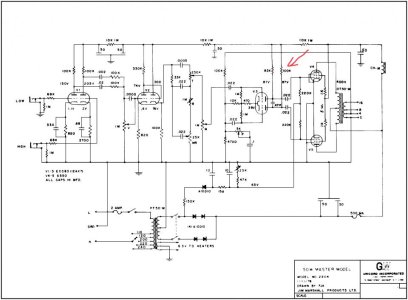Tiliev
New member
Hi guys!
My name is Steve, and I have JMP-50 2204 amp with EL34’s!
Well.... it sounds horrible!
I have replaced everything I could think of and I could!
Tubes, filter caps, trim pot,bias caps, pots, jacks tube sockets, a lot of other caps!
.....still sound awful:-(
On low volumes it is not that bad, but the more I push the preamp when master is more then 50% (5-6) , the worse it sounds!
Well....with Marshall tube amps is supposed to be the other way around isn’t it !
!
And I have tried it with all different preamp and power tubes!
I was checking and rechecking the bias from time to time on a new purchased installed well matched pair of Svetlanas, and the last time I did it, I left the probe and meter on V5 , and found something that definitely didn’t look right to me!?
Before that :My amp plate voltage is 400V!
Most JMP’s are on 600V, but few run at lower : at 400V!
My JMP is one of them!
So I have set the bias around 37mA idle!
There was around 0.3~0.4mA difference between V4 and V5 at idle!
I have one of these socket probes that goes between tube and amp socket with probes to be plugged in meter! I am biasing the amp, on mV setting on the digital multimeter!
After about 15 min waiting for the bias settling in ,I left the probe and the meter on the way it was, and start playing!
The readings on the meter went up, which it should!
When I was swapping the probe back and forth between V4 and V5
, I found V5 voltage was jumping a lot higher then V4!
And as I said above,the more I was pushing the amp, the bigger that difference became!
For example:
The highest readings on louder lower notes on V4 was reaching 45mV, while V5 was going way higher to 130mV!
If I stop playing, both will go back to 37.0 37.4!
The lauder the amp is pushed, the bigger the voltage reading differences between V4 and V5 !
If I swap the tubes, the higher readings are still on V5!
I would guess, there is crossover distortion caused by the big difference in the current draw between V4 and V5!
What possibly can cause such a dissbalance Between the two tubes when amp is pushed!??
All transformers are room temperature!
No hum or any other signs of something being wrong?!
I have Marshall JMP, and now i’am recording with amp simulators .......yuck !
Please Help!
Any suggestions would be highly appreciated!
Thanks for Your Help, and Kind Regards!
Steve!

My name is Steve, and I have JMP-50 2204 amp with EL34’s!
Well.... it sounds horrible!
I have replaced everything I could think of and I could!
Tubes, filter caps, trim pot,bias caps, pots, jacks tube sockets, a lot of other caps!
.....still sound awful:-(
On low volumes it is not that bad, but the more I push the preamp when master is more then 50% (5-6) , the worse it sounds!
Well....with Marshall tube amps is supposed to be the other way around isn’t it
And I have tried it with all different preamp and power tubes!
I was checking and rechecking the bias from time to time on a new purchased installed well matched pair of Svetlanas, and the last time I did it, I left the probe and meter on V5 , and found something that definitely didn’t look right to me!?
Before that :My amp plate voltage is 400V!
Most JMP’s are on 600V, but few run at lower : at 400V!
My JMP is one of them!
So I have set the bias around 37mA idle!
There was around 0.3~0.4mA difference between V4 and V5 at idle!
I have one of these socket probes that goes between tube and amp socket with probes to be plugged in meter! I am biasing the amp, on mV setting on the digital multimeter!
After about 15 min waiting for the bias settling in ,I left the probe and the meter on the way it was, and start playing!
The readings on the meter went up, which it should!
When I was swapping the probe back and forth between V4 and V5
, I found V5 voltage was jumping a lot higher then V4!
And as I said above,the more I was pushing the amp, the bigger that difference became!
For example:
The highest readings on louder lower notes on V4 was reaching 45mV, while V5 was going way higher to 130mV!
If I stop playing, both will go back to 37.0 37.4!
The lauder the amp is pushed, the bigger the voltage reading differences between V4 and V5 !
If I swap the tubes, the higher readings are still on V5!
I would guess, there is crossover distortion caused by the big difference in the current draw between V4 and V5!
What possibly can cause such a dissbalance Between the two tubes when amp is pushed!??
All transformers are room temperature!
No hum or any other signs of something being wrong?!
I have Marshall JMP, and now i’am recording with amp simulators .......yuck !
Please Help!
Any suggestions would be highly appreciated!
Thanks for Your Help, and Kind Regards!
Steve!

